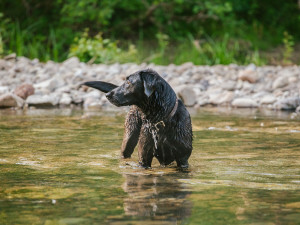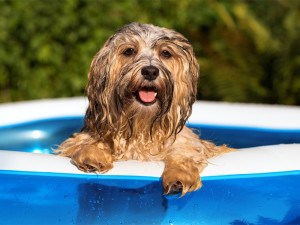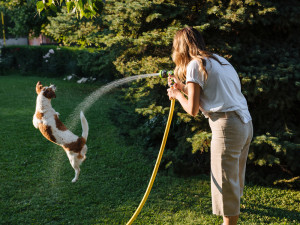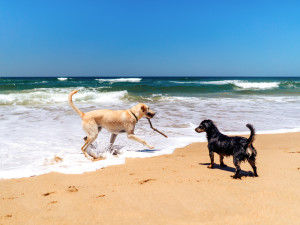When Drinking Too Much Water Is Deadly
How to keep your swim fan safe.
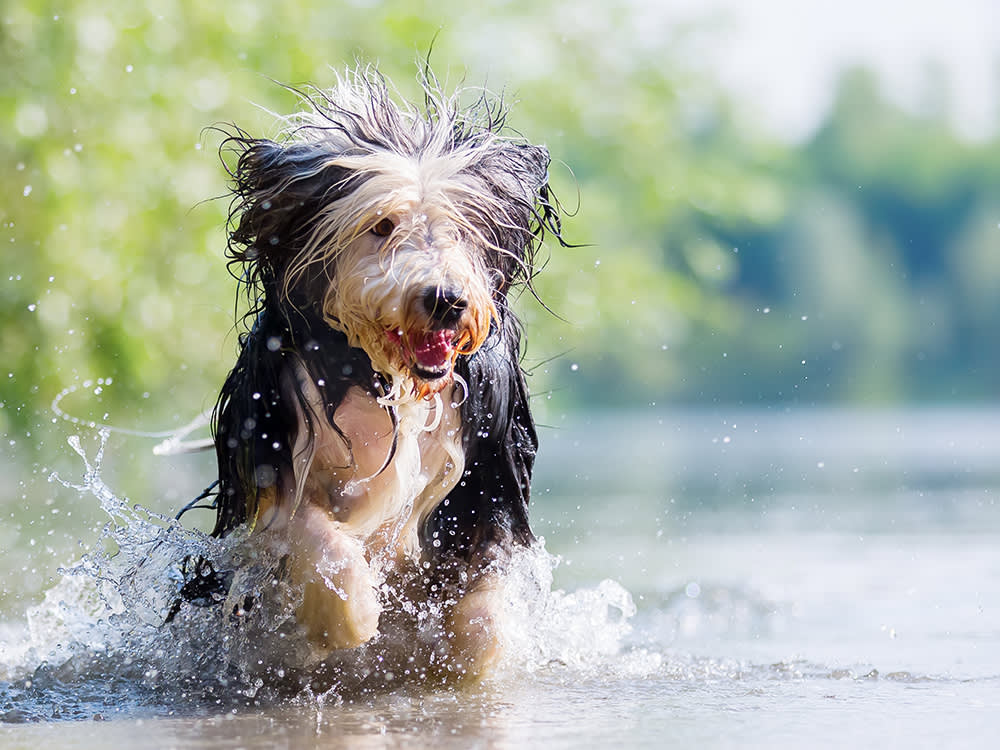
Share Article
Last week, a friend’s dog had a close call with water intoxication. Her dog crew was playing in a local river when one of her Border Collies emerged staggering and vomiting liquid. Symptoms quickly worsened on the way to the vet, but after a few harrowing days, the pup was fortunate to make a full recovery. Apparently, her dog ingested too much water while repeatedly diving into the river, mouth open, trying to catch a ball. Drinking too much causes electrolyte levels to drop, thinning blood plasma and leading to swelling of the brain and other organs.
Before I learned about water intoxication, I thought that playing in the lake (or any body of water) was safe if your dog was a strong swimmer. But now I know to be mindful of how my pups interact with the water and force them to take ample breaks. Dogs can even drink too much water from playing with a lawn sprinkler, believe it or not. Unfortunately, water intoxication progresses quickly. Now that summer is officially here, it’s important to review the signs so you can get your pup to the vet as soon as possible.
Causes of water intoxication in dogs
When too much water is consumed in a short period of time — especially if the dog isn’t urinating or throwing up any of the water — the balance of electrolytes in the dog's body is disrupted, which can cause a disturbance in brain function. Water intoxication can lead to brain damage, heart failure, and even death. Fortunately, water poisoning isn’t common, but it’s important to be aware of the risk. The most frequent cases involve swimming dogs that ingest too much water and dogs who drink too many fluids after playing or exercising.

Symptoms of water intoxication
Symptoms of water intoxication in dogs include lack of coordination, lethargy, nausea, bloating, vomiting, dilated pupils, glazed eyes, light gum color, and excessive salivation. Advanced symptoms include difficulty breathing, collapsing, loss of consciousness, and seizures.
Treatment of water intoxication
Because water intoxication in dogs can progress so quickly, time is critical. If your dog exhibits these symptoms, get to a vet immediately to run blood work. A low level of electrolytes will confirm the condition. Treatment for water intoxication includes fluids to put electrolytes back in the system and sometimes a diuretic. As the weather gets warmer, both pups and their parents need to practice water safety. Stay hydrated and don’t drink the ocean water (that goes for both of you).

JoAnna Lou
JoAnna Lou is a New York City-based researcher, writer and agility enthusiast.
Related articles
![Black Lab playing in creek]()
Why Your Dog Should Stay Far, Far Away From Blue-Green Algae This Summer
Consider getting a water-testing kit to keep your pup safe.
![Avoid heat stroke in dogs by sprinkling in the backyard with your dog]()
How to Keep Your Dog Safe From Heatstroke This Summer
Temperatures are rising dangerously. Keep your pet safe with these tips.
![Shepherd dog playing with yellow ball at the beach]()
How to Keep Your Dog Safe at the Beach This Summer
5 tips to help your pup have fun in the sun — safely.
![a dog in a dog pool]()
The Best Dog Pools For Your Dog to Splash Around in This Summer
It’s summer fun time, baby.
![A woman spraying her excited dog with a garden hose in the grassy backyard]()
7 End-of-Summer Activities for You and Your Dog
Stay cool (and safe) out there.
![Labrador Retriever and Dachsund playing with a stick at the beach shoreline]()
Summer Is Heating Up. Here Are 6 Ways to Keep Your Dog From Doing the Same
Pro tips to keep your pup safe, happy, and exercised during the warmer months.



